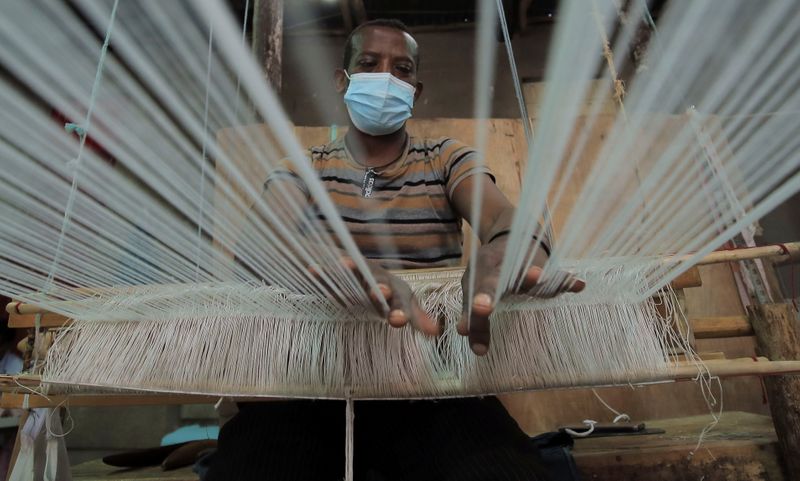By Dawit Endeshaw
ADDIS ABABA (Reuters) -In a crowded Addis Ababa factory, Finoteselam Nigussie's needle plunges in-and-out of the gauzy white cloth she deftly guides through a sewing machine.
Like thousands of other Ethiopian women, stitching shawls for export to the United States pays the 40-year-old textile worker's rent and her daughter's school fees.
Now though, Finoteselam's job is in danger as the United States ponders suspending Ethiopia's duty-free market status, citing abuses and a growing famine in the war-ravaged northern Tigray region.
Suspension of benefits under the African Growth and Opportunity Act (AGOA) would threaten Ethiopia's aspirations to become a light manufacturing hub and dent hard-won economic gains in a nation once a byword for hunger and poverty.
"We have used AGOA since we started business," said Finoteselam's boss Sammy Abdella, who set up the company nearly two decades ago and employs 250 people.
"People ... have worked with us since we have started. We have created a family," he added, his voice cracking.
Although Ethiopia is not a large global supplier, suspension of its U.S. trade status would be yet another problem on the list for global fashion brands such as The Children's Place (NASDAQ:PLCE), Tommy Hilfiger and Calvin Klein as COVID-19 disrupts manufacturing capacity, ports and supply chains.
WAR HORRORS
Washington has repeatedly expressed concern over widespread reports of sexual violence https://www.reuters.com/article/us-ethiopia-conflict-rape-specialreport-idAFKBN2C20P0 by Ethiopian and allied Eritrean soldiers in Tigray, where local forces have battled the military and its allies for a year.
The United Nations says a de facto blockade of aid https://www.reuters.com/world/africa/un-aid-chief-ethiopia-famine-tigray-get-those-trucks-moving-2021-09-28 has forced 400,000 people into famine. On Thursday, it said no food convoys had entered Tigray for the past 10 days. There have been many reports of mass killings https://www.reuters.com/investigates/special-report/ethiopia-conflict-expulsions of civilians.
The government has denied blocking aid and said individual soldiers have been tried for any abuses, without giving details. Eritrea has denied committing abuses.
Washington has already laid the ground for sanctions https://www.reuters.com/article/ethiopia-conflict-usa-sanctions-idAFW1N2Q1023, with its chief trade representative promising a decision soon https://www.reuters.com/world/africa/us-trade-chief-ethiopias-duty-free-market-status-be-decided-soon-2021-10-14 on its AGOA status.
The act gives sub-Saharan African nations duty-free access to the United States if they meet criteria including removing barriers to U.S. trade and progress towards political pluralism.
Prime Minister Abiy Ahmed's chief trade negotiator Mamo Mihretu told Reuters that AGOA had directly created 200,000 jobs and indirectly created millions.
"We should not politicize trade issues," he told Reuters.
Over the past decade, Ethiopia has spent billions constructing a dozen industrial parks and related infrastructure. Some factories produce goods for fashion giant PVH (NYSE:PVH), owner of the Calvin Klein, Speedo and Tommy Hilfiger labels.
At Finoteselam's company, Sammy Ethiopia, around 90% of products are exported to the United States, via retailers such as Eileen Fisher and Anthropologie.
Exports to the United States account for three quarters of the firm's annual turnover of over $200,000. If Ethiopia is suspended, Sammy said his company will close.
Ethiopia exported about $237 million worth of goods duty-free to the United States under AGOA in 2020, U.S. commerce department data shows, more than 90% of it textiles and apparel.
Duty-free access is a major draw for companies including Gap and Sweden's H&M. The full impact a suspension on foreign investors and Ethiopian companies exporting to the United States is not yet clear, with layoffs and order cancellations possible.
'ADDED HEADACHE'
Mamo warned an AGOA suspension would hurt U.S. companies trying to diversify production from Asia by relocating or expanding to Ethiopia.
Conlumino, a retail research agency and consulting firm, noted, however, that Ethiopia's textile exports to the United States were still minuscule compared to the likes of China, Bangladesh and India.
Though Ethiopia would suffer from a AGOA suspension; retailers will find alternatives despite the havoc from COVID-19, said Neil Saunders, a Conlumino analyst.
"The suspension of AGOA will not have a huge impact on clothing retail," he said. "However - as this will come at a time when global manufacturing capacity is already reduced and retailers are struggling to keep up with demand - it is an added headache."
An H&M spokesperson said the company was following developments regarding AGOA carefully, but it was too early to comment. In December, H&M said its long-term manufacturing and sourcing strategy involves Ethiopia and it did not plan to change. But its Ethiopia production is comparatively small.
U.S.-based apparel companies The Children's Place, Gap and PVH did not respond to requests for comment.
A senior PVH official previously said the 10-year renewal of AGOA in 2015 "was a critical factor in PVH's decision to invest", according to a 2017 case study of PVH in Ethiopia published by the World Bank and co-authored by Mamo.
In 2018, PVH said Ethiopia could become a top supplier because it grows cotton, dyes fabrics and sews garments. It established a joint venture to operate a factory in Hawassa city, the company's first such venture in 30 years.
Raghavendra Pattar is CEO of Nasa Garment, a manufacturer in Hawassa Industrial Park. Nasa exports about 95% of its garments to U.S. companies. It employs 1,200 workers, mostly women, and spent $7 million to set up the factory two years ago.

But an AGOA suspension would halt expansion.
"AGOA … is the reason buyers are coming to Ethiopia and sourcing manufacturing here," he said. "If the duty benefit is taken away, the buyers will go to another country."